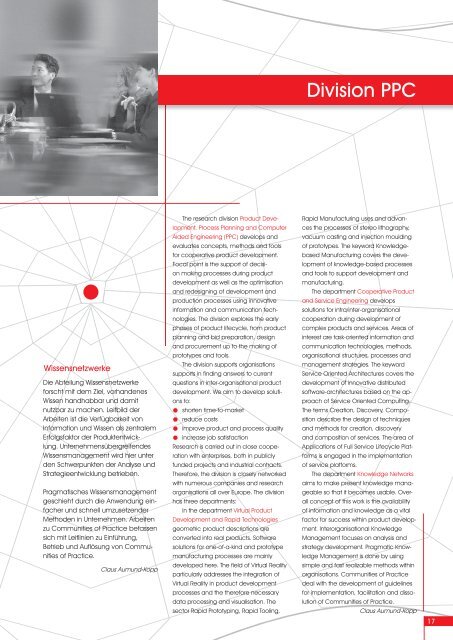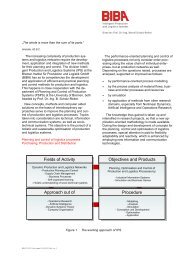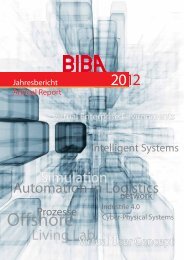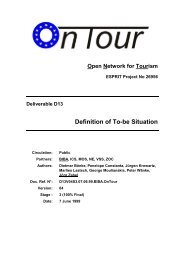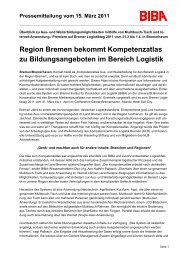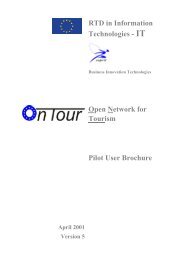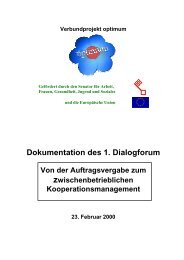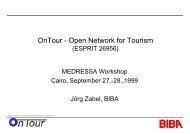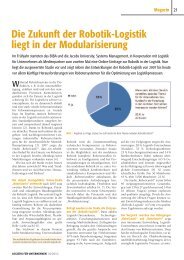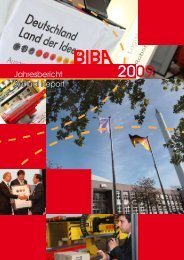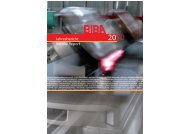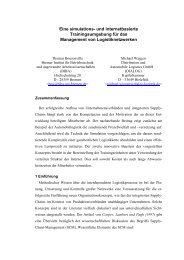Jahresbericht 2003/2004 - Biba - Universität Bremen
Jahresbericht 2003/2004 - Biba - Universität Bremen
Jahresbericht 2003/2004 - Biba - Universität Bremen
Erfolgreiche ePaper selbst erstellen
Machen Sie aus Ihren PDF Publikationen ein blätterbares Flipbook mit unserer einzigartigen Google optimierten e-Paper Software.
Wissensnetzwerke<br />
Die Abteilung Wissensnetzwerke<br />
forscht mit dem Ziel, vorhandenes<br />
Wissen handhabbar und damit<br />
nutzbar zu machen. Leitbild der<br />
Arbeiten ist die Verfügbarkeit von<br />
Information und Wissen als zentralem<br />
Erfolgsfaktor der Produktentwicklung.<br />
Unternehmensübergreifendes<br />
Wissensmanagement wird hier unter<br />
den Schwerpunkten der Analyse und<br />
Strategieentwicklung betrieben.<br />
Pragmatisches Wissensmanagement<br />
geschieht durch die Anwendung einfacher<br />
und schnell umzusetzender<br />
Methoden in Unternehmen. Arbeiten<br />
zu Communities of Practice befassen<br />
sich mit Leitlinien zu Einführung,<br />
Betrieb und Auflösung von Communities<br />
of Practice.<br />
Claus Aumund-Kopp<br />
The research division Product Development,<br />
Process Planning and Computer<br />
Aided Engineering (PPC) develops and<br />
evaluates concepts, methods and tools<br />
for cooperative product development.<br />
Focal point is the support of decision<br />
making processes during product<br />
development as well as the optimisation<br />
and redesigning of development and<br />
production processes using innovative<br />
information and communication technologies.<br />
The division explores the early<br />
phases of product lifecycle, from product<br />
planning and bid preparation, design<br />
and procurement up to the making of<br />
prototypes and tools.<br />
The division supports organisations<br />
supports in finding answers to current<br />
questions in inter-organisational product<br />
development. We aim to develop solutions<br />
to:<br />
shorten time-to-market • reduce costs • improve product and process quality<br />
• increase job satisfaction<br />
• Research is carried out in close cooperation<br />
with enterprises, both in publicly<br />
funded projects and industrial contracts.<br />
Therefore, the division is closely networked<br />
with numerous companies and research<br />
organisations all over Europe. The division<br />
has three departments:<br />
In the department Virtual Product<br />
Development and Rapid Technologies<br />
geometric product descriptions are<br />
converted into real products. Software<br />
solutions for one-of-a-kind and prototype<br />
manufacturing processes are mainly<br />
developed here. The field of Virtual Reality<br />
particularly addresses the integration of<br />
Virtual Reality in product development<br />
processes and the therefore necessary<br />
data processing and visualisation. The<br />
sector Rapid Prototyping, Rapid Tooling,<br />
Division PPC<br />
Rapid Manufacturing uses and advances<br />
the processes of stereo lithography,<br />
vacuum casting and injection moulding<br />
of prototypes. The keyword Knowledgebased<br />
Manufacturing covers the development<br />
of knowledge-based processes<br />
and tools to support development and<br />
manufacturing.<br />
The department Cooperative Product<br />
and Service Engineering develops<br />
solutions for intra/inter-organisational<br />
cooperation during development of<br />
complex products and services. Areas of<br />
interest are task-oriented information and<br />
communication technologies, methods,<br />
organisational structures, processes and<br />
management strategies. The keyword<br />
Service Oriented Architectures covers the<br />
development of innovative distributed<br />
software-architectures based on the approach<br />
of Service Oriented Computing.<br />
The terms Creation, Discovery, Composition<br />
describe the design of techniques<br />
and methods for creation, discovery<br />
and composition of services. The area of<br />
Applications of Full Service Lifecycle Platforms<br />
is engaged in the implementation<br />
of service platforms.<br />
The department Knowledge Networks<br />
aims to make present knowledge manageable<br />
so that it becomes usable. Overall<br />
concept of this work is the availability<br />
of information and knowledge as a vital<br />
factor for success within product development.<br />
Interorganisational Knowledge<br />
Management focuses on analysis and<br />
strategy development. Pragmatic Knowledge<br />
Management is done by using<br />
simple and fast realizable methods within<br />
organisations. Communities of Practice<br />
deal with the development of guidelines<br />
for implementation, facilitation and dissolution<br />
of Communities of Practice.<br />
Claus Aumund-Kopp<br />
17


